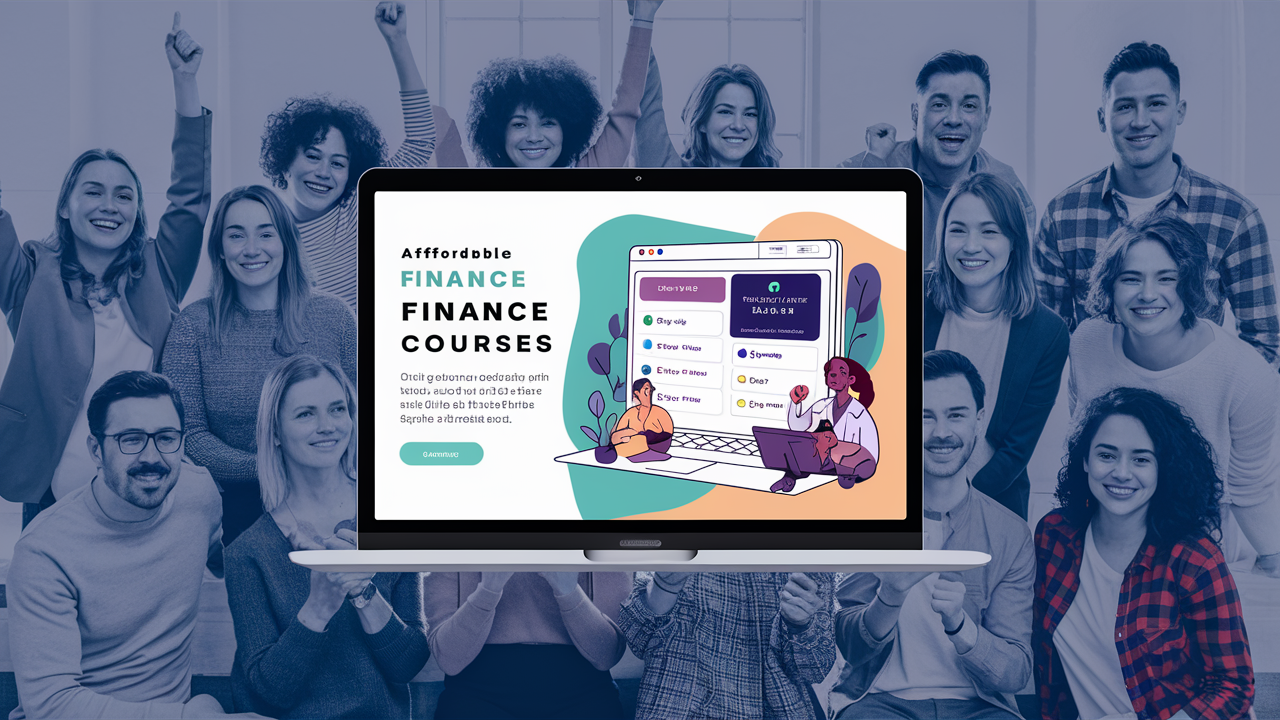
Introduction
In today’s fast-paced world, understanding finance is more important than ever. Whether you’re looking to improve your personal finance skills or advance your career, there are many affordable online courses available. These courses offer high-quality education at a fraction of the cost of traditional programs. Here’s a look at some of the best affordable online finance courses for budget learners.
1. Introduction to Finance and Accounting Specialization (Coursera)
Course Overview
This specialization, offered by the University of Pennsylvania, provides a comprehensive introduction to finance and accounting. It covers financial markets, accounting principles, and corporate finance.
Key Benefits
- Taught by professors from a top university.
- Flexible schedule and self-paced learning.
- Financial aid is available for those who qualify.
Cost
Access to individual courses within the specialization is available for free, but a certificate requires a fee (approximately $49 per month).
2. Personal Finance 101: Everything You Need to Know (Udemy)
Course Overview
This course is designed for individuals looking to gain control over their finances. It covers budgeting, saving, investing, and managing debt.
Key Benefits
- Practical tips and strategies for everyday financial management.
- Lifetime access to course materials.
- Highly rated by students.
Cost
Often available at discounted rates (typically around $19.99 during sales).
3. Financial Markets (Coursera)
Course Overview
Offered by Yale University, this course provides insights into the workings of financial markets. It covers risk management, behavioral finance, and the role of financial institutions.
Key Benefits
- Taught by renowned professor Robert Shiller, a Nobel Laureate in Economics.
- Engaging in video lectures and real-world case studies.
- Flexible deadlines and self-paced learning.
Cost
Free to audit, with a certificate available for a fee (approximately $49).
4. Corporate Finance Essentials (edX)
Course Overview
This course, offered by IESE Business School, covers the fundamental principles of corporate finance. Topics include capital budgeting, financial analysis, and the cost of capital.
Key Benefits
- Free access to course content.
- Option to earn a verified certificate.
- Highly respected business school instructors.
Cost
Free to audit, with a verified certificate available for a fee (approximately $50).
5. Introduction to Financial Accounting (Coursera)
Course Overview
This course from the University of Pennsylvania provides a solid foundation in financial accounting. It covers the preparation and analysis of financial statements.
Key Benefits
- Clear and concise explanations of accounting concepts.
- Practical examples and exercises.
- Self-paced with flexible deadlines.
Cost
Free to audit, with a certificate available for a fee (approximately $49).
6. Finance for Everyone: Smart Tools for Decision-Making (edX)
Course Overview
Offered by the University of Michigan, this course teaches the fundamentals of finance through real-life applications. It covers the time value of money, risk, and return, and financial decision-making.
Key Benefits
- Engaging content with interactive tools and quizzes.
- Free access to all course materials.
- Option to earn a verified certificate.
Cost
Free to audit, with a verified certificate available for a fee (approximately $49).
7. Personal & Family Financial Planning (Coursera)
Course Overview
This course, offered by the University of Florida, focuses on personal and family financial planning. It covers budgeting, saving, investing, and retirement planning.
Key Benefits
- Practical advice for managing personal and family finances.
- Flexible schedule and self-paced learning.
- Financial aid is available for those who qualify.
Cost
Free to audit, with a certificate available for a fee (approximately $49).
8. Finance for Non-Financial Professionals (Coursera)
Course Overview
Offered by the University of California, Irvine, this course is designed for individuals without a finance background. It covers basic financial concepts and tools used in business.
Key Benefits
- Clear and accessible explanations of finance principles.
- Flexible schedule and self-paced learning.
- Practical applications for non-finance professionals.
Cost
Free to audit, with a certificate available for a fee (approximately $49).
9. Financial Literacy (Alison)
Course Overview
This free course from Alison covers essential financial literacy topics, including budgeting, saving, investing, and retirement planning.
Key Benefits
- Completely free access to all course materials.
- Short, manageable modules.
- Certificate available upon completion.
Cost
Free, with an optional certificate available for a fee (approximately $20).
10. Investment and Portfolio Management (Coursera)
Course Overview
This course, offered by Rice University, provides an in-depth understanding of investment and portfolio management. It covers asset allocation, risk management, and portfolio performance evaluation.
Key Benefits
- Taught by experienced finance professors.
- Practical investment strategies and tools.
- Flexible schedule and self-paced learning.
Cost
Free to audit, with a certificate available for a fee (approximately $49).
Conclusion
Investing in your financial education doesn’t have to break the bank. These affordable online finance courses offer high-quality education at a fraction of the cost of traditional programs. By taking advantage of these resources, you can improve your financial literacy, advance your career, and achieve your personal finance goals. Start exploring these courses today and take the first step towards a brighter financial future.
FAQs
1. Are there free online finance courses available?
Yes, many platforms offer free courses that you can audit. Some also provide financial aid for certificate programs.
2. Can I get a certificate for these courses?
Most courses offer certificates for a fee. The cost varies by platform and course.
3. How long do these courses take to complete?
Course durations vary, ranging from a few hours to several weeks. Many are self-paced, allowing you to learn at your convenience.
4. Are these courses suitable for beginners?
Yes, most of these courses are designed to be accessible for beginners, covering fundamental concepts in finance.
5. Can I improve my career prospects with these courses?
Absolutely. Gaining financial knowledge and skills can enhance your resume and improve your career prospects in various fields, including business, accounting, and financial planning.


